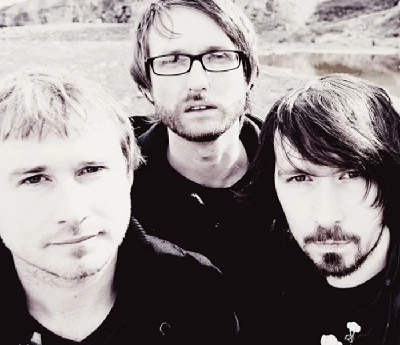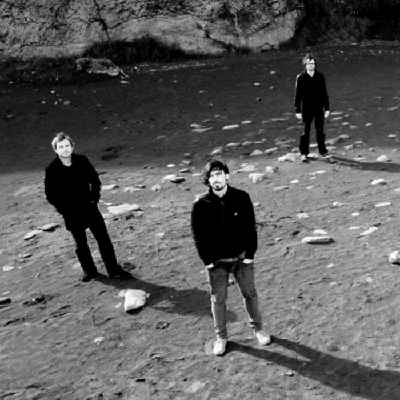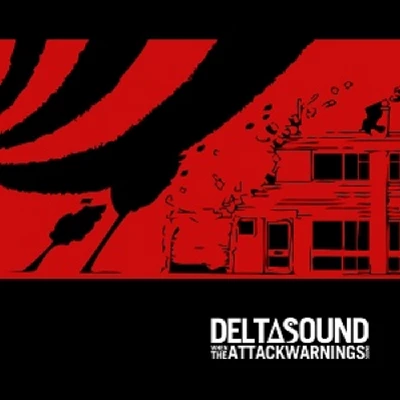published: 24 /
3 /
2013

John Clarkson speaks to Jonjo McNeill and Adrian Huggins from Newcastle-based trio Deltasound, whose debut album ‘When the Attack Warnings Sound’, which reflects ominously on nuclear disaster, they have just released as a pay-as-you-want release
Article
“Can you tell me what Kim Kardashian actually does?” says Jonjo McNeill. “And why she is so famous because I can’t get an answer from anyone? It just baffles me. Yet people watch her show and they really love it. It just really pisses me off.”
McNeill, who is the front man with Newcastle-based trio Deltasound, and his group’s bassist Adrian Huggins are on the telephone in separate calls to Pennyblackmusic to speak about their band’s “wake-up call” of a debut album, ‘When the Attack Warnings Sound’. He is talking about ‘The New Cancer’, one of the songs on the ten-track album.
“That track is about the present sickness in society,” McNeill explains. “It is about dumbing down. We are all in danger of dying of stupidity. Most of the music that you listen to on daytime radio has got nothing to it and no soul. And the telly is the same, and there are all these people lapping it up and thinking that it is great. They are happy with that, and they are not looking for anything more. There is a line in it: “You know more about me/Than the mother that you will never see.” That is just about the sheer amount of bandwidth in the world that is taken up by people who are famous for absolutely nothing. People look online or buy magazines just to find out what they are wearing, what they are eating, where they are going to, but you couldn’t tell me that about your next door neighbour. You couldn’t tell me about the person across the street”
McNeill (vocals, guitars, programming) formed Deltasound with Huggins (bass), Craig Hutchison (drums, programming) and the group’s original other guitarist Andrew Ridley in 2007. They started out with the aim of taking “elements of dance music, and to make songs out of them with real instruments.” While their music still has amidst its thunderous, furious sound a strong dance component, it now also includes synthesisers and computer programming.
“We have evolved basically,” says Huggins. “We were a little too prescriptive before. We have learnt to try not to steer it too far in one direction if things aren’t going that way. We let the songs dictate the direction instead of saying that they have to sound like this. The vast majority of the songs on ‘When the Attack Warnings Sound’ - seven out of ten-on them - we did on the computer. They have lent themselves more to keyboards and synthesisers and the use of programmed beats instead of us just trying to work out a few guitar chords as we used to. I think it has worked to the group’s benefit.”
“The material needed a synthetic edge to it,” adds McNeill, who is the group’s main songwriter. “I wanted it to sound like a machine or at parts something mechanical. It suited the theme of the album as well.”
Deltasound, who define themselves as a “pre-apocalyptic electro grunge act”, started out in a blaze of activity. They recorded two EPs, ‘EP1’ (2007) and ‘EP2’ (2008), within quick succession of each other. The first came out within nine months of the group forming, and they followed these two EPs with a single, ‘Dust Can Explode’, in 2009. They also toured relentlessly in their first two and a half years together, playing gigs as far afield from Newcastle as London in one direction and Inverness in another.
In recent years, gigs have been rarer, and have been largely confined to the North East. There was also a long, fallow period of almost three years in which Deltasound released no material, before returning last summer with two pre-album singles, ‘Probably/Sunshine’ and ‘Enemy/Our Machines’, and then finally with ‘When the Attack Warnings Sound’ in November.
McNeill, Huggins and Hutchison have all got married since forming Deltasound and McNeill also has had a son who is now three, but this only partially explains the group’s lessening of profile and its pulling back.
“We had a set agenda during the first few years,” reflects Huggins. “We wanted to go as far as we could. That got frustrating in the end. We weren’t enjoying it as much as we should have been. There was definitely an element of ‘There should be more people there’ or ‘Should there be more interest’? We also did some gigs that were rubbish and we ended up feeling really deflated afterwards.”
“We played all over the place,” says McNeill. “And we played some great places, but we also played some total dives. We got to a point that we had done that many gigs in dives that we didn’t really have the patience anymore to discover how shit a place can be.”
The group towards the end of 2009 hit a crisis point when Andrew Ridley decided to leave the band. The remaining trio split up briefly, before deciding to carry on.
“Andy is a great guitarist and a great lad,” says Huggins about his former band mate, who since leaving Deltasound has been writing and playing acoustic solo material. “It just wasn’t he wanted to do anymore, and what he wanted to do we didn’t do either. It was only so long that it could go on.”
“When Andy walked out, we tried getting someone else in, but it just didn’t seem right,” recalls McNeill. “We were trying to play the same songs and same set, but it was a different dynamic and the dynamic was wrong. When you have five or six practices in a row and everyone leaves feeling disheartened, then you know that something is wrong.”
While McNeill, Higgins and Hutchinson soon decided to continue as a three-piece, their temporary split led to the band completely re-evaluating the way in which it worked and organised itself.
“The first couple of years that we were doing all these gigs we only had seven or eight songs,” says Huggins. “We had written a good early spate of stuff, but it dried up after a while. We were playing the same songs. We had to practice for all these gigs that were happening at the time. We didn’t have the time to step back and concentrate on the writing. We had put ourselves into a corner really.”
“Once everything settled down, Jonjo started banging songs out again and we got all our enthusiasm back,” he continues. “We would rather spend a weekend now recording or writing new material than going up and down the country and playing songs that we have been doing for three or four years.”
‘When the Attack Warnings Sound’ was recorded over a two year period in all three members’ homes and also at their rehearsal room. It is a tense album which combines whirlwind, discordant guitars with cascading synthesisers and frantic electronic beats. McNeill’s angry, cigarette-scarred vocals conjure up a nightmare vision of a world in which political and corporate corruption has become rife. There are hidden governmental agendas, culture has collapsed and nuclear annihilation is imminent. Yet this is not a dystopian account of the future, but a portrait of the world of today, as for both McNeill and Huggins the threat of nuclear Armageddon, rather than being something which died out at the end of the 1980s with the end of the Cold War, is omnipresent.
“There is more of a nuclear threat than there ever was because there are more nuclear weapons,” says McNeill matter-of-factly. “America hasn’t dismantled any of its nuclear weapons. They have got thousands of warheads. North Korea is now starting to test them. The powerful countries don’t talk anymore about decommissioning nuclear weapons. They will try to stop newer and smaller countries from having them, but they don’t lead by example by getting rid of their own, so the threat is always going to be there until they are destroyed.”
“People laugh about it and say, ‘Of course, the world is not going to end,’” says Huggins. “And we are saying, ‘Of course, it could. It could happen at any time.’ I am not saying it is going to end next week. I am not going to start panic buying or giving my possessions or anything like that. There is this Swedish punk band called Disfear and they have an album out called ‘An Arrogant Breed’, and that to me seems like the perfect phrase. We all like to think that it can’t happen to us, but it is that kind of arrogance that we need to push against. If you turn a blind eye to everything, then of course things are going to get worse.”
‘When the Attack Warnings Sound’ is opened and closed by ‘Skydown’, an eerie piano piece. The otherwise instrumental opening track contains samples from ‘Protect and Survive’, a set of government information films of the late 1970s and early 1980s. Featuring voiceovers by English actor Patrick Allen (which were also infamously used by Frankie Goes To Hollywood on their 1984 second single ‘Two Tribes’) they provided notoriously ineffectual advice on how to survive a nuclear holocaust. The samples Deltasound have chosen have the Allen reflecting on the potential impact of a nuclear explosion, and how long one should stay in shelter after one has gone off. The closing track, ‘Skydown Reprise’, has a multi-tracked vocal from McNeill mourning that “Tonight the sky fell down”, and concludes with a sudden apocalyptic roll of thunder and then an extended, long note.
“That last song is about the afterlife,” says McNeill. “You can tell that song is building up to something and then it just flat lines. When you die, then I think that nothing happens and everything is over. It is literally about the end of the world.”
‘When the Attack Warnings Sound’ is available from Deltasound’s Bandcamp site on a pay-as-you-want basis. The group are still deliberating about whether to also do a CD edition, but in the meantime both McNeill and Huggins are pleased with the response that the album has been attracting.
“We have all realised that no one is making money out music anymore,” says Huggins, explaining Deltasound’s reason for deciding to do this. “And it is not what we are in it for anyway. We would rather in the end that a hundred people enjoyed it and had it for free than ten people paid five quid or a tenner for it but were the only ones who heard it. We have put a lot into this album. We want people to hear it.”
“It has been downloaded a lot,” adds McNeill. “About a third of people have downloaded it for free, whereas everyone else has paid for it. It has brought in a little bit of money for us to go towards our rehearsal space. The average price people are paying for it £10, which for a download seems quite high to me, but I think people are letting us know that they appreciate the option they have been given, and giving us the thumbs up for the music.”
“We have done a few shows lately, but we are going to take a few months away from gigging now and come back with some more tunes,” says Huggins when asked what the future holds for Deltasound.
“We are just going to write and see what happens. Hopefully it will be enough for an EP, but it might be more and another album,” concludes McNeill. “We are just going to take things as they come.”
‘When the Attack Warnings Sound’ reveals a bleak despair at the prospects of the world. The group itself seems, however, to have learnt much from the mistakes of its past, and it has returned after its extended absence with a new energy and renewed sense of focus
‘When the Attack Warnings Sound’ can be bought or downloaded for free from www.deltasound.bandcamp.com
Band Links:-
http://deltasound.tumblr.com/
https://www.facebook.com/deltasounduk
https://deltasound.bandcamp.com/music
https://www.youtube.com/user/deltasoun
https://plus.google.com/10892849091596
Picture Gallery:-

